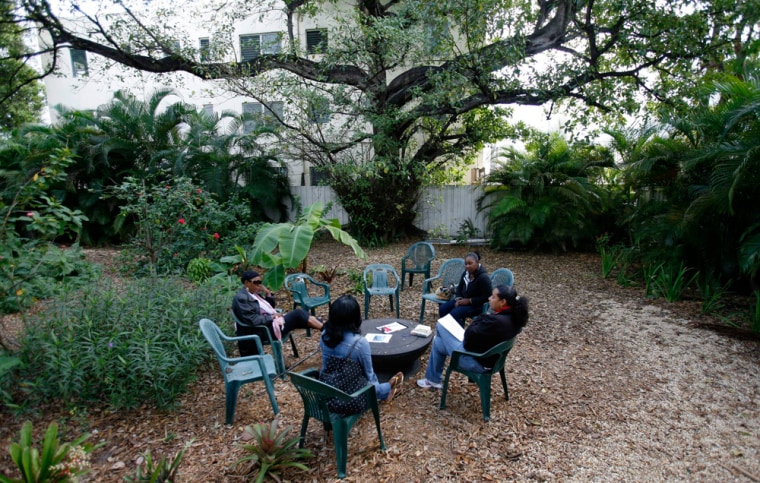In the mornings, the loudest sound at Lotus House is the running water from the main courtyard's fountain.
The once homeless women bustle about in pajamas. Some eat breakfast before work, others sit in a secluded corner surrounded by trees to smoke or talk.
This is a women's sanctuary, a place to restart life without drugs, alcohol, crime or abuse — the problems that put them on the street. Opened in 2006 in Overtown — one of Miami's toughest neighborhoods — Lotus House aims to address the women's emotional and physical needs and prepare them to live independently. Experts say the shelter, funded by a mix of private and public money, offers one of the most comprehensive homeless programs in the state and should be a model for facilities nationwide.
"I am so blessed and grateful. This is the best time of my life," said Lisa Romano, 42, who has been at the shelter since leaving drug rehab almost four months ago.
Women recasting their lives
At any given time there are up to 50 residents and 16 infants at the shelter, which puts a heavy emphasis on using art to help women recast their lives. The women receive life coaching, day care assistance and prenatal care. They can attend daily meditation and classes in art, creative writing, jewelry making, cooking and yoga. The average stay is about six months.
They also learn basic computer and job-hunting skills. There is a stock of interview clothes. Staff can arrange for tutors in math, English literacy and other subjects. Bus tokens are provided for transport to a job or interview. When the women leave they are given furniture and anything they need for their new living space, right down to the silverware.
Tom Pierce, director of the state's Office on Homelessness, said the program stands out for its array of services and its focus on using art to help its residents heal.
"Those are things you don't typically find geared toward the homeless."
That was the vision of the founder, former real estate developer Constance Collins Marguiles. As a teen, she saw a homeless woman digging through garbage on the streets of New York City and wondered how anyone could be happy if even one person lived like that. She never forgot.
"When I reached a point in my business career where I was blessed enough to give back, I did it," she said. "I was really moved to the work because there were so many women on the streets."
Why focus on art?
Marguiles has placed art throughout the shelter, including the room where residents get their weekly therapy sessions. On the wall hangs a photograph by Moroccan-born Lalla Essaydi of women covered with fabric decorated with Arabic calligraphy.
In the kitchen hang works by French artist Denise A. Aubertin, who has stuck flour, spices and nuts on books and then baked them — a different kind of cookbook.
Missouri-born artist Megan McLarney's video landscapes play on four screens in another room. But in the bedrooms no art is hung so the women sharing the space can express themselves.
Why so much focus on art?
"Through art we learn to touch our collective soul," Marguiles said. "We are reminded when we see art, we are all interconnected."
Art even helps to pay the bills at Lotus House, which has an annual budget of $850,000. About 15 percent comes from state and local grants. Much of the rest is raised through individual donations and private and public foundations. The house also earns money by selling photography and poetry created by residents and professionals. Marguiles' husband, Martin Z. Marguiles, is an affluent art collector.
Still, she worries about the effect the recession may have on the shelter.
"Normally we would get the bulk of our food from the food bank," she said "The food banks are depleted." The staff is trying to persuade grocery stores and markets to give them surplus food.
'Treated with dignity'
David Raymond, executive director of the Miami-Dade County Homeless Trust, said Lotus House is the only homeless shelter in the county that focuses on helping single women and women with very young children. The county has about 4,600 homeless people. About 20 percent are women.
For Romano, Lotus House has given her a chance to rebuild her life. She said she goes to all the art classes and has even teamed up with a college student who used to teach the class. They roam the neighborhood and take black-and-white photographs of the people in the community and buildings.
"We are really treated with dignity and respect here," she said.
Another resident, Jacqueline Gedin from Port-au-Prince, Haiti, proudly shows off her art work. She has propped up some paintings in the front hall of the suite she shares with two other women. Many of her paintings are symbolic, depicting women and landscapes from her homeland.
It might not mean much to others, "but when I look at it, I smile," Gedin said.
RT Johnson, the health and wellness coordinator, was once a resident. She says she turned to drugs after her son was murdered and then both of her parents died within months of each other. Today she lives blocks from the center and is active within the homeless community.
"I am like a miracle," she said. "There are no programs for women. This place is like an illusion that somebody's vision brought to reality."
More on Homelessness
